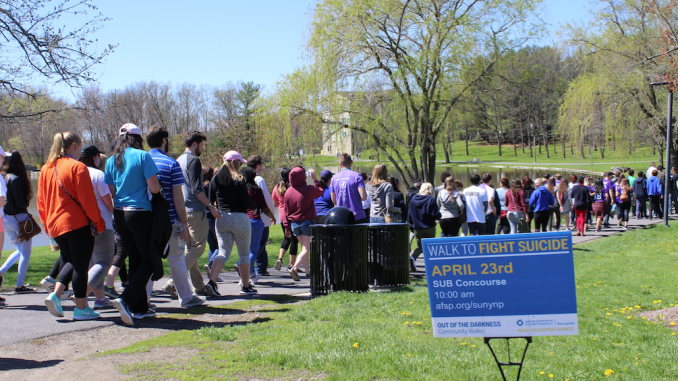
Hoping to comfort those personally affected by mental illness, SUNY New Paltz held its eighth annual Out of the Darkness walk — a fundraising event in support of suicide prevention and awareness.
On Sunday, April 23, the local Hudson Valley chapter of the American Foundation for Suicide Prevention (AFSP) and the New Paltz Association for Suicide Awareness/Prevention (ASAP) hosted the walk, an important part of AFSP’s efforts to reduce the annual suicide rate 20 percent by 2025.
These two organizations participated in the walk for the same reason: to erase the stigma against talking about suicide and mental health, as well as to bring the subject “out of the darkness.”
“We need to keep having this conversation,” said ASAP President and third-year sociology major Dan Holohan. “Just to see suicide prevention on campus is such a positive thing. It makes people less fearful [of talking about it].”
By the time the event started at 10 a.m., the fundraising goal of $6,500 had already been surpassed. By the end of the day, $8,387 had been raised toward the cause, with 179 registered walkers having participated. Maria Idoni, director of the Hudson Valley chapter of AFSP, said that this was the most money SUNY New Paltz participants had ever raised throughout the eight years of the event’s history on campus, as well as the biggest walk the College has hosted.
Along with addressing the issue of failing to talk about suicide and mental health, Out of the Darkness walks aim to support and comfort those who may be suffering as well as those who may have lost loved ones to suicide.
Idoni sees these walks as an opportunity to bring these people together and to let them know that they are not alone. Holohan feels similarly, thinking back to the April 2016 death of his friend Tom O’Rourke, a former SUNY New Paltz student and the reason behind the creation of ASAP.
“People tend to be afraid to talk about this issue, but it’s so important that we continue to normalize it,” he said. “It’s also important to just take a day and reflect on the past year, remember those we’ve lost and honor their lives as well as learn something from their deaths.”
Guest speakers said a few words before the walk began at 11 a.m. Dr. Gwenyth Lloyd, director of the psychological counseling center, spoke about the resources students have available to them on campus, including the counseling center as well as OASIS/HAVEN, located in the basement of Deyo Hall. Second was Cait O’Connor, a SUNY New Paltz alumna who came to the event to tell her personal tale of struggling with mental illness and how she continues to overcome her battles.
Last up was third-year psychology major and vice president of ASAP Allen Nissar, the former roommate of O’Rourke. Like O’Connor, he spoke about his personal struggles, along with how he’s dealt with the death of his roommate and friend.
“The word ‘suicide’ carries a heavy stigma and the consequence of that is it ending up sealed behind the lips of those who need help,” Nissar said. “Losing a friend opened our [ASAP members’] eyes to the pressures that life can put on a person. Suicide is only tragic and shattering to those caught in the crossfire. While I still have not fully recovered from Tom’s passing, I have come a long way and am happy to share this story in hopes that it might educate or inspire others.”
AFSP statistics show that 6 percent of undergraduate and 4 percent of graduate students have seriously considered suicide in the past year, but because of the stigma associated with it, an estimated half of those people failed to tell anyone. Major stress producers on college campuses include tuition cost, competitiveness, acceptance rates and the economy. Recent studies have also showed that the emotional health of college freshmen is currently at a 25-year low.
Steve Dolce, a board of member of the Hudson Valley chapter of AFSP, said the biggest challenge AFSP has is getting people to understand that it is OK to ask for help.
“Our biggest message is to let [people] know that asking for help doesn’t mean that they are compromising who they are,” he said. “Through these walks, we’re trying to help other people and make sure that those who passed didn’t die in vain — maybe there’s some meaning to that tragic thought. We’re trying to get people to get to that next event, to the next minute, the next hour, the next day.”
If you or someone you know is having suicidal thoughts, you can call the National Suicide Prevention Line at 1-800-273-8255, OASIS/HAVEN at 845-257-4945, Steve Dolce at 845-891-5808, or visit the SUNY New Paltz Psychological Counseling Center.
